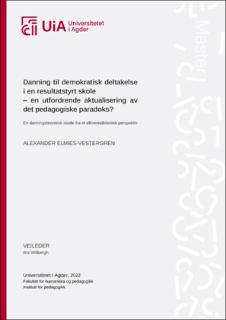| dc.description.abstract | The question of how education can contribute to democracy is a question with roots in antiquity. It is also highly relevant considering the current initiatives within national and transnational educational policy to strengthen the school’s role in promoting democracy and citizenship. Answers to how school can and should contribute to democracy, are many and diverse. Through this study I hope to give a small contribution to the understanding of the topic by investigating how Bildung for democratic participation is understood in the perspective of general didactics.
Through a hermeneutical approach I analyze relevant theory within German and Nordic Bildung-centered general didactics (e.g. Klafki and von Oettingen) with regards to autonomy, orientation towards society and the educational paradox. Through the understanding of these three ideas the analysis gives insight into two aspects of Bildung; 1) Bildung as an ideal for democratic participation, and 2) Bildung as a process with implications for the way of teaching.
In this study’s analysis I show how autonomy, in the perspective of general didactics, is understood as both a prerequisite and a goal in the Bildung process. Through the linking of autonomy to responsibility – and a critical orientation towards society – general didactics promote an ideal of an independent and responsible, critical and political form of participation, which connects to liberal, republican, communitarian and deliberative democracy. With the goal of autonomy, teaching must deal with the educational paradox; how to cultivate autonomy through the exercise of power. The paradox represents a challenge, which from the perspective of general didactics may be met through ‘non-affirmative’ teaching. This refers to a way of teaching where students are ‘encouraged to self-activity’ – to use their autonomy and ‘take a stand’ – facing a normative content regarding key challenges in society. Finally, I show how this way of teaching requires autonomous, reflective teachers, who can interpret how content and teaching may encourage their students to self-activity, in their specific contexts of teaching.
Considering the insights from the analysis I discuss how the idea of participation through the independent ‘taking of stands’, may be a relevant foundation for participation within different views of democracy. I also discuss how general didactics’ preparatory approach to education for participation, may be relevant – and necessary – in a time when researchers within the field emphasize the importance of letting students experience real participation. Finally, I discuss how the non-affirmative and encouraging teaching is challenged by demands of efficiency and control in education, and I show how the educational paradox encourages us to accept the ‘inefficiency’ and uncertainty of teaching to make room for the possibility of Bildung for democratic participation. | |
